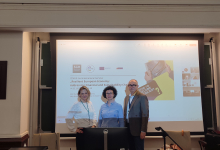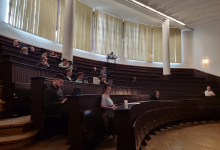Date:
May 14, 2025
On May 14, 2025, the 2nd international scientific seminar entitled “„Resilient European Economy: Addressing Financial and Sustainability Challenges” was held as part of the CEWSE II project.
The scale and speed of economic and political change, which pose a range of threats to the socio-economic order of the world, of states and of regions, make the issue of economic security more important and give it a new expression. At a time of profound geopolitical shifts, technological disruptions, climate change and the aftermath of a global pandemic, the resilience of the European economy has become a matter of urgency. Building resilience is no longer just about recovering from crises - it is about anticipating risks, adapting to rapid change and ensuring that our economies remain robust, inclusive and sustainable in the face of uncertainty.
Invited experts Prof. Daniel Felisini - Director of PhD in History and Social Sciences, President PhD School at University of Rome Tor Vergata and Patryk Dybek, WSE PhD Candidate, Certified CIMA Member, Graduate of the Warsaw School of Economics “Young Scientist Program”, Consultant at Newmark Global Consulting gave presentations on two areas of the EU economy that are particularly timely and critical: financing European industrial policy and the use of artificial intelligence in banking.
In her presentation, Prof. D. Felisini pointed out that, in economic and financial terms, the EU reconstruction instrument was a turning point, but not in political terms. The investments financed by the NGEU are ongoing, so it is too early to assess their impact on growth and productivity. However, if the effects are overwhelmingly positive, there is a greater chance that the NGEU and its mechanisms will be institutionalised. Financially, the NGEU has paved the way for the future issuance of European safe financial assets; demand for this type of collateral is strong and may increase in the future. Politically, the current political situation in many European countries does not bode well for the possible institutionalisation of the NGEU mechanism as unity of purpose and vision, which enabled the launch of the original NGEU, is lacking. However, political conditions can change, so it is important to have action plans that can be activated quickly.
Mr Patrick Dybek presented the growing role of artificial intelligence in transforming financial services, improving operational efficiency and risk management, and enhancing customer engagement. He pointed out that, while digitisation increases productivity, it also exposes systems to cyber threats that can exploit interconnections. Attacks on critical infrastructure can have a cascading effect throughout the financial system due to its close interconnectedness. The likelihood of cyber-attacks is linked to financial globalisation, political uncertainty, and the level of economic development. Therefore, it is necessary to develop macro-prudential tools to monitor and mitigate cyber risks.
A recording of the event is available on YouTube: Centre of Excellence SGH Warsaw School of Economic - YouTube

Funded by the European Union. Views and opinions expressed are however those of the author(s) only and do not necessarily reflect those of the European Union or the European Education and Culture Executive Agency (EACEA). Neither the European Union nor EACEA can be held responsible for them.

